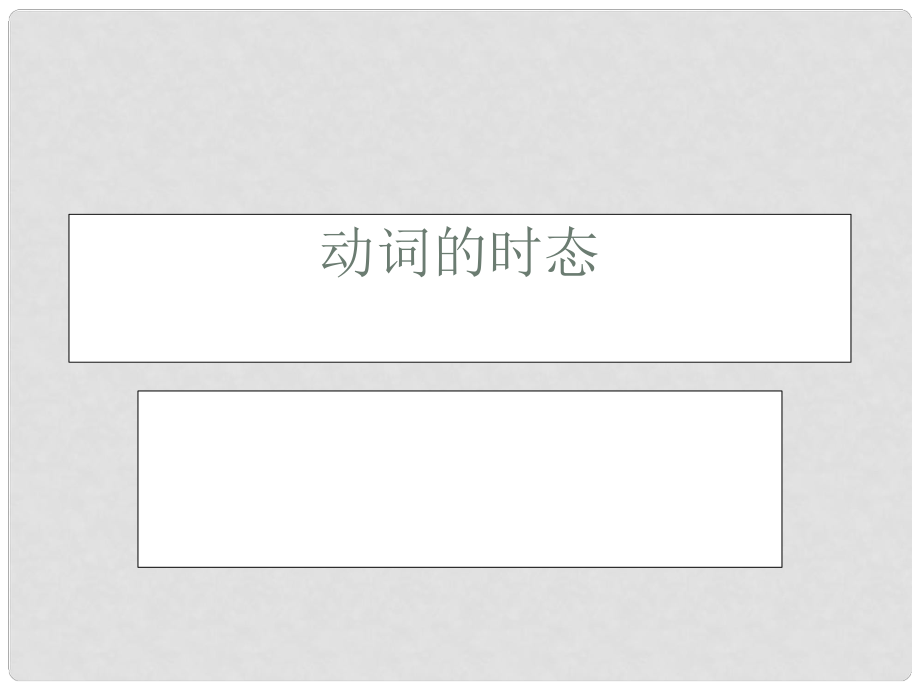《重慶市北大附中重慶實(shí)驗(yàn)學(xué)校高三英語《語法 動(dòng)詞的時(shí)態(tài)》課件》由會(huì)員分享�,可在線閱讀,更多相關(guān)《重慶市北大附中重慶實(shí)驗(yàn)學(xué)校高三英語《語法 動(dòng)詞的時(shí)態(tài)》課件(30頁珍藏版)》請?jiān)谘b配圖網(wǎng)上搜索�。
1、動(dòng)詞的時(shí)態(tài)概念概念:時(shí)態(tài)是英語謂語動(dòng)詞的一種形式時(shí)態(tài)是英語謂語動(dòng)詞的一種形式,表示動(dòng)作發(fā)生的時(shí)間表示動(dòng)作發(fā)生的時(shí)間和所處的狀態(tài)和所處的狀態(tài).英語中的時(shí)態(tài)是通過動(dòng)詞形式本身的變英語中的時(shí)態(tài)是通過動(dòng)詞形式本身的變化來實(shí)現(xiàn)的化來實(shí)現(xiàn)的.英語有英語有16種時(shí)態(tài)種時(shí)態(tài),但中學(xué)階段較常用的有但中學(xué)階段較常用的有十種十種:一般現(xiàn)在時(shí)一般現(xiàn)在時(shí),一般過去時(shí)一般過去時(shí),一般將來時(shí)一般將來時(shí),過去將來時(shí)過去將來時(shí),現(xiàn)在進(jìn)行時(shí)現(xiàn)在進(jìn)行時(shí),過去進(jìn)行時(shí)過去進(jìn)行時(shí),將來進(jìn)行時(shí)將來進(jìn)行時(shí),過去完成時(shí)過去完成時(shí),英在英在完成時(shí)和現(xiàn)在完成進(jìn)行時(shí)完成時(shí)和現(xiàn)在完成進(jìn)行時(shí).2. 一般過去時(shí) 1.一般現(xiàn)在時(shí)的用法一般現(xiàn)在時(shí)的用法 1)
2�、 經(jīng)常性或習(xí)慣性的動(dòng)作,常與表示頻腮度的時(shí)間狀語連經(jīng)常性或習(xí)慣性的動(dòng)作�,常與表示頻腮度的時(shí)間狀語連用。時(shí)間狀語:用�。時(shí)間狀語: every, sometimes,at, on Sunday。例如:例如: I leave home for school at 7 every morning. 每天每天早上我七點(diǎn)離開家�。早上我七點(diǎn)離開家�。. 例:例:Columbus proved that the earth is round哥倫布證哥倫布證實(shí)了地球是圓的。實(shí)了地球是圓的。 2) 客觀真理�,客觀存在,科學(xué)事實(shí)�。例如:客觀真理,客觀存在�,科學(xué)事實(shí)。例如: The earth moves around
3�、 the sun. 地球繞太陽轉(zhuǎn)動(dòng)。地球繞太陽轉(zhuǎn)動(dòng)�。 Shanghai lies in the east of China. 上上 海位于中國東部。海位于中國東部�。 3) 表示格言或警句。例如:表示格言或警句�。例如: Pride goes before a fall.驕者必?cái) r溦弑財(cái) ?注意:此用法如果出現(xiàn)在賓語從句中�,即使主句是過去注意:此用法如果出現(xiàn)在賓語從句中,即使主句是過去時(shí)�,從句謂語也要用一般現(xiàn)在時(shí)。時(shí)�,從句謂語也要用一般現(xiàn)在時(shí)。 1)在確定的過去時(shí)間里所發(fā)生的動(dòng)作或存在的狀態(tài)�。例)在確定的過去時(shí)間里所發(fā)生的動(dòng)作或存在的狀態(tài)。例如:時(shí)間狀語有:如:時(shí)間狀語有:yesterday,
4�、last week, an hour ago, the other day, in 1982等。例如:等�。例如: Where did you go just now? 剛才你上哪兒去了?剛才你上哪兒去了? 2)表示在過去一段時(shí)間內(nèi)�,經(jīng)常性或習(xí)慣性的動(dòng)作。例)表示在過去一段時(shí)間內(nèi)�,經(jīng)常性或習(xí)慣性的動(dòng)作。例如:如: When I was a child, I often played football in the street. 我是個(gè)孩子的時(shí)候�,常在馬路上踢足球。我是個(gè)孩子的時(shí)候�,常在馬路上踢足球。Whenever the Browns went during their visit, the
5�、y were given a warm welcome. 那時(shí),布朗一家無論什么時(shí)候去�,都受到熱烈歡迎。那時(shí)�,布朗一家無論什么時(shí)候去,都受到熱烈歡迎�。 3)句型:)句型:It is time for sb. to do sth 到到時(shí)間了時(shí)間了 該該了了。例如:�。例如:It is time for you to go to bed. 你你該睡覺了。該睡覺了�。 It is time that sb. did sth. 時(shí)間已遲了時(shí)間已遲了 早早該該了了 , 4) be about to +不定式�,意為馬上做某事。例如: He is about to leave for Beijing. 他馬上要
6�、去北京。 注意:be about to do 不能與tomorrow, next week 等表示明確將來時(shí)的時(shí)間狀語連用�。 4. 一般現(xiàn)在時(shí)表將來一般現(xiàn)在時(shí)表將來 1)下列動(dòng)詞)下列動(dòng)詞come, go, arrive, leave, start, begin, return的一般現(xiàn)在時(shí)可以表示將來�,主要的一般現(xiàn)在時(shí)可以表示將來�,主要用來表示在時(shí)間上已確定或安排好的事情�。例如:用來表示在時(shí)間上已確定或安排好的事情。例如: The train leaves at six tomorrow morning. 火車明天上午六點(diǎn)開�。火車明天上午六點(diǎn)開�。 When does the bus star?
7、 It stars in ten minutes. 汽車什么時(shí)候開�?十分鐘后。汽車什么時(shí)候開�?十分鐘后。 2)以)以here, there等開始的倒裝句�,表示動(dòng)作正等開始的倒裝句,表示動(dòng)作正在進(jìn)行�。例如:在進(jìn)行。例如: 5. 用現(xiàn)在進(jìn)行時(shí)表示將來用現(xiàn)在進(jìn)行時(shí)表示將來 下列動(dòng)詞come, go, arrive, leave, start, begin, return等現(xiàn)在進(jìn)行時(shí)可以表示將來�。例如: Im leaving tomorrow. 明天我要走了。 Are you staying here till next week? 你會(huì)在這兒呆到下周嗎�? )現(xiàn)在完成時(shí)可表示持續(xù)到現(xiàn)在的動(dòng)作或狀態(tài),動(dòng)
8�、詞一般是)現(xiàn)在完成時(shí)可表示持續(xù)到現(xiàn)在的動(dòng)作或狀態(tài),動(dòng)詞一般是延續(xù)性的�,如延續(xù)性的,如live, teach, learn, work, study, know.�。 一般過去時(shí)常用的非持續(xù)性動(dòng)詞有一般過去時(shí)常用的非持續(xù)性動(dòng)詞有come, go, leave, start, die, finish, become, get married等�。例如:等�。例如: I saw this film yesterday. (強(qiáng)調(diào)看的動(dòng)作發(fā)生過了)(強(qiáng)調(diào)看的動(dòng)作發(fā)生過了) I have seen this film. (強(qiáng)調(diào)對現(xiàn)在的影響,電影的內(nèi)容已(強(qiáng)調(diào)對現(xiàn)在的影響�,電影的內(nèi)容已經(jīng)知道了)經(jīng)知道了) Why
9、 did you get up so early? (強(qiáng)調(diào)起床的動(dòng)作已發(fā)生過(強(qiáng)調(diào)起床的動(dòng)作已發(fā)生過了)了) Who hasnt handed in his paper? (強(qiáng)調(diào)有卷子未交�,疑(強(qiáng)調(diào)有卷子未交,疑為不公平競爭)為不公平競爭) He has been in the League for three years. (在團(tuán)內(nèi)的狀(在團(tuán)內(nèi)的狀態(tài)可延續(xù))態(tài)可延續(xù)) He has been a League member for three years. (是團(tuán)(是團(tuán)員的狀態(tài)可持續(xù))員的狀態(tài)可持續(xù)) 句句3子中如有過去時(shí)的時(shí)間副詞(如子中如有過去時(shí)的時(shí)間副詞(如yesterday, las
10�、t, week, in 1960) 9.過去完成時(shí) 1) 概念:表示過去的過去 -|-|-|- 其構(gòu)成是had +過去分詞構(gòu)成。 2) 用法 a. 在told, said, knew, heard, thought等動(dòng)詞后的賓語從句�。例如: She said (that)she had never been to Paris. 她告訴我她曾去過巴黎。 10. 用一般過去時(shí)代替過去完成時(shí)用一般過去時(shí)代替過去完成時(shí) 1)兩個(gè)動(dòng)作如按順序發(fā)生�,又不強(qiáng)調(diào)先后,或用then�,and,but 等連詞時(shí)�,多用一般過去時(shí)。例如: When she saw the mouse�,she screamed. 她看到
11、老鼠�,就叫了起來。 12現(xiàn)在進(jìn)行時(shí)現(xiàn)在進(jìn)行時(shí) 現(xiàn)在進(jìn)行時(shí)的基本用法:現(xiàn)在進(jìn)行時(shí)的基本用法: a. 表示現(xiàn)在(指說話人說話時(shí))正在發(fā)生的事情�。表示現(xiàn)在(指說話人說話時(shí))正在發(fā)生的事情。例如:例如: We are waiting for you. 我們正在等你�。我們正在等你。 b. 習(xí)慣進(jìn)行:表示長期的或重復(fù)性的動(dòng)作�,說話時(shí)習(xí)慣進(jìn)行:表示長期的或重復(fù)性的動(dòng)作�,說話時(shí)動(dòng)作未必正在進(jìn)行�。例如:動(dòng)作未必正在進(jìn)行。例如: 15. 一般現(xiàn)在時(shí)代替一般將來時(shí)一般現(xiàn)在時(shí)代替一般將來時(shí) When, while, before, after, till, once, as soon as, so long as,
12�、by the time, if, in case (that), unless, even if, whether, the moment, the minute, the day, the year, immediately等引導(dǎo)的時(shí)間狀語從句,條件句中�,用一般現(xiàn)在時(shí)代替將來時(shí)�。例如: He is going to visit her aunt the day he arrives in Beijing. 他一到北京,就去看他姨媽�。 18. 一般現(xiàn)在時(shí)代替現(xiàn)在進(jìn)行時(shí)。一般現(xiàn)在時(shí)代替現(xiàn)在進(jìn)行時(shí)�。 在Here comes/There goes等句型里,用一般現(xiàn)在時(shí)代替現(xiàn)在進(jìn)行時(shí)�。例如: Ther
13、e goes the bell. 鈴響了�。 3、I don t know whether Mother_ me to Beijing next month.(take)4�、She _ on her coat and went out. (put)5、 “What are they doing?” “They_ ready for the sports meeting.” (get)6�、The boy asked his mother _him go and play basketball.(let) 18、Our teacher told us if it _(not snow) we wou
14�、ld visit the Science Museum the next day.19、They often _ (play) football in the afternoon.20�、A: Whatre you doing Dad? B: I_(mend) the radio. 21、Lets _(carry) the boxes to the house.22�、Yesterday she _(want) very much to see the film, but she couldnt _(get) a ticket.23�、I _(write) to you as soon as I g
15�、et to Shanghai.24、Mike _(visit) several places since he came to Beijing. 34�、Wei Fang isnt here. She _ (go) to the reading-room.35、The story _ (happen) long ago. 45�、The students_ (clean) their classroom tomorrow. 46、The windows of our lab _ (clean) once a week.47�、Our teacher _ (join) the party twenty years ago.48、The boys_ (have) a basketball match now. Lets _(go) and _(watch).49�、She_ (work) in this factory for ten years.50、 “What makes you _ (think) Im a farmer?” the Frenchman asked.
 重慶市北大附中重慶實(shí)驗(yàn)學(xué)校高三英語《語法 動(dòng)詞的時(shí)態(tài)》課件
重慶市北大附中重慶實(shí)驗(yàn)學(xué)校高三英語《語法 動(dòng)詞的時(shí)態(tài)》課件

